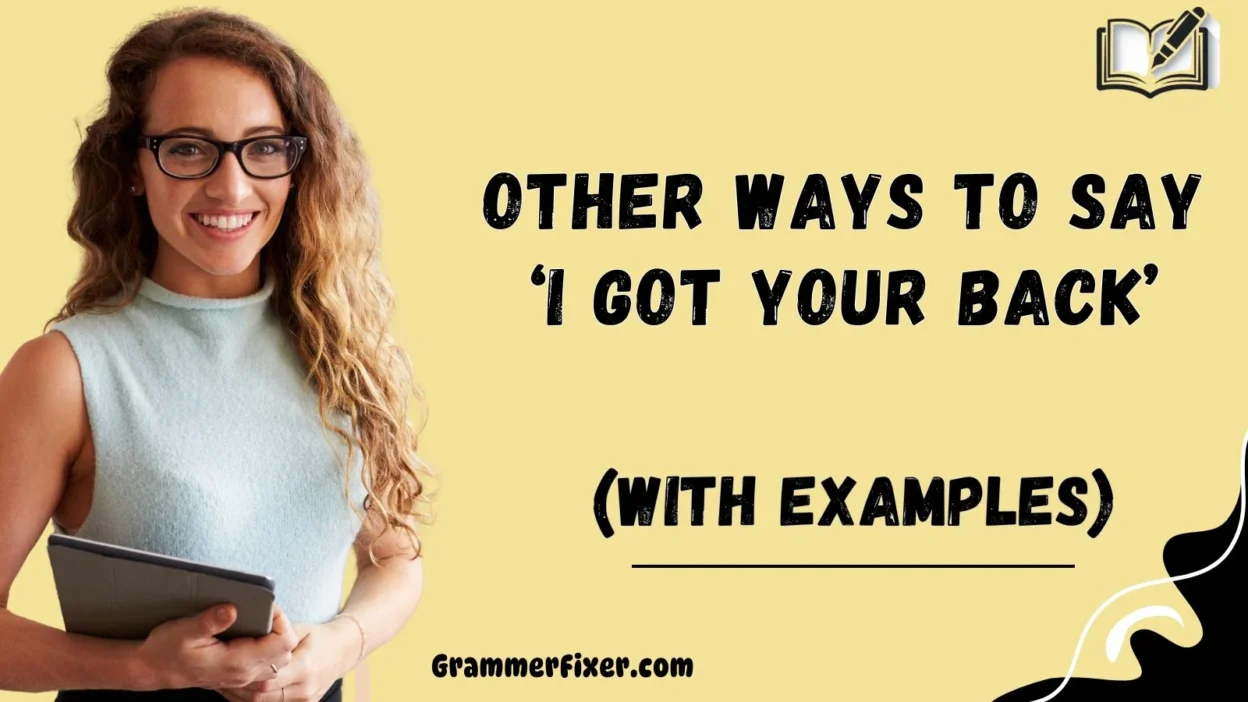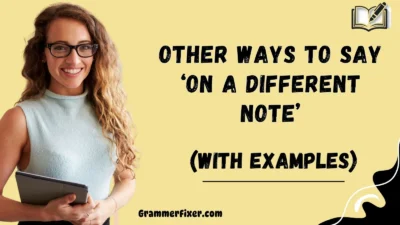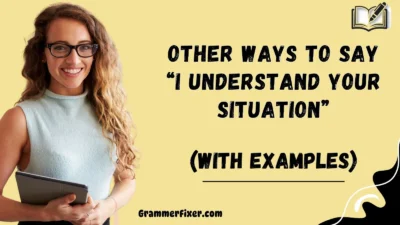Finding the right words to express care and solidarity can make all the difference in building trust, connection, and meaningful relationships. Whether it’s in the workplace, among friends, or with family, saying “I got your back” reassures someone that they’re not alone.
This article explores 30 thoughtful synonyms and alternatives that carry the same warmth, encouragement, and support, each with clear meanings, examples, and best-use guidance.
What Does “I Got Your Back” Mean?
The phrase “I got your back” means providing support, protection, and reassurance to someone. It originates from military and combat culture, where soldiers literally watched each other’s backs. Today, it’s used more casually to show loyalty, encouragement, and readiness to help.
When to Use “I Got Your Back”?
You can use this phrase in personal conversations, team settings, or challenging situations when someone needs reassurance. It’s especially useful:
- When a friend is going through difficult times
- When a colleague faces a tight deadline
- When a family member needs emotional encouragement
- When building team morale
Is It Professional/Polite to Say “I Got Your Back”?
In most casual and friendly workplaces, yes—it’s warm and supportive. However, in formal emails, official presentations, or highly traditional environments, a more professional synonym (like “I’m here to support you”) may be better.
Pros or Cons
Pros:
- Shows loyalty and personal reassurance
- Builds trust and stronger bonds
- Conveys a warm, supportive tone
Cons:
- Can be seen as too informal in strict professional settings
- Might be misunderstood in cultures that prefer direct or formal communication
- Could imply overcommitment if not followed with genuine action
1. I’m Here for You
Meaning: Expresses presence, emotional support, and reliability.
Detailed Explanation: It assures someone they are not alone and that you’re willing to stand by them.
Scenario Example: “Don’t worry about the client call—I’m here for you if you need backup.”
Best Use: Personal or professional reassurance.
Worst Use: In highly formal business correspondence (like legal or government reports), where it may sound too casual or vague.
Tone: Warm, empathetic, approachable.
10. I’m Standing with You
Meaning: Shows solidarity and moral support, reinforcing that the person is not alone.
Detailed Explanation: Often used when someone is facing challenges, it emphasizes shared struggle and unity.
Scenario Example: “During these negotiations, I’m standing with you every step of the way.”
Best Use: Situations requiring encouragement, unity, or emotional reinforcement.
Worst Use: In technical or task-driven contexts (like fixing a spreadsheet error), where the phrase may feel too abstract or dramatic.
Tone: Strong, encouraging, empathetic.
11. I’ll Stand by You
Meaning: Communicates unwavering loyalty and commitment.
Detailed Explanation: Similar to “I got your back,” but slightly more formal and enduring.
Scenario Example: “No matter what happens with the client’s decision, I’ll stand by you.”
Best Use: Personal relationships and long-term commitments.
Worst Use: Casual, everyday teamwork (like group projects) where the tone may feel too heavy-handed.
Tone: Loyal, heartfelt, supportive.
12. I’m With You All the Way
Meaning: Indicates continuous encouragement and shared responsibility.
Detailed Explanation: Conveys both emotional reassurance and practical partnership.
Scenario Example: “From planning to delivery, I’m with you all the way.”
Best Use: Projects requiring long-term cooperation or emotional reassurance.
Worst Use: Brief or low-stakes tasks, where it could come across as overly intense.
Tone: Enthusiastic, motivational, loyal.
13. You’re Not Alone
Meaning: Affirms emotional support and companionship.
Detailed Explanation: Useful in sensitive or vulnerable situations, it reassures someone they are not facing struggles in isolation.
Scenario Example: “I know the transition is tough, but remember—you’re not alone.”
Best Use: Personal conversations, mental health support, comforting friends.
Worst Use: Workplace emails or professional documents, as it may feel too intimate.
Tone: Gentle, nurturing, compassionate.
14. I’ll Back You Up
Meaning: Highlights readiness to defend, assist, or confirm someone’s actions.
Detailed Explanation: Often used in teamwork or debates, it implies reliability and advocacy.
Scenario Example: “If anyone questions the proposal, I’ll back you up with the data.”
Best Use: Workplace discussions, group decision-making, debates.
Worst Use: Personal emotional support—it may sound too transactional or defensive.
Tone: Assertive, practical, supportive.
15. I’ll Help You Out
Meaning: A casual expression of willingness to assist.
Detailed Explanation: Simple and friendly, it shows readiness to lend a hand without being too formal.
Scenario Example: “If the deadline feels tight, I’ll help you out with the research.”
Best Use: Friendly workplace conversations, casual teamwork, friends.
Worst Use: Formal presentations or emails where the phrase may feel too informal.
Tone: Friendly, approachable, helpful.
16. I’ve Got You
Meaning: A shorter, modern twist on “I got your back.”
Detailed Explanation: Often used in casual or supportive contexts, it implies trust and reliability.
Scenario Example: “Don’t worry about the logistics—I’ve got you.”
Best Use: Close colleagues, friends, and informal teamwork.
Worst Use: Formal professional communications, where it may sound too slangy or vague.
Tone: Casual, reassuring, loyal.
17. I’m Committed to Supporting You
Meaning: Emphasizes dedication and professionalism.
Detailed Explanation: Stronger than casual reassurance, this phrase underscores a serious, ongoing commitment.
Scenario Example: “As your mentor, I’m committed to supporting you in achieving your goals.”
Best Use: Mentorship, leadership, professional guidance.
Worst Use: Everyday small favors—it may sound too heavy for minor tasks.
Tone: Professional, steady, formal.
18. I’ll Be There for You
Meaning: Shows availability, care, and loyalty.
Detailed Explanation: Popular in both personal and professional contexts, it reassures the person of your presence when needed.
Scenario Example: “When the new project begins, I’ll be there for you to make things easier.”
Best Use: Friendships, family support, teamwork reassurance.
Worst Use: Highly formal situations (legal or business contracts), where it sounds too casual.
Tone: Warm, encouraging, approachable.
19. I’ll Defend You
Meaning: Communicates protection, advocacy, and loyalty.
Detailed Explanation: Stronger than most alternatives, it shows you’re ready to stand up for someone in conflict or opposition.
Scenario Example: “If there’s pushback in the meeting, I’ll defend you and your decisions.”
Best Use: Workplace debates, difficult negotiations, personal advocacy.
Worst Use: Everyday tasks—it may sound too combative or dramatic.
Tone: Bold, assertive, protective.
20. I’ll Help Carry the Load
Meaning: Emphasizes sharing responsibilities and reducing burdens.
Detailed Explanation: Suggests teamwork and willingness to lighten someone’s stress.
Scenario Example: “Don’t stress about the reports, I’ll help carry the load.”
Best Use: Team projects, workplace collaboration, family responsibilities.
Worst Use: Personal emotional struggles, where it may feel too literal or task-focused.
Tone: Supportive, cooperative, practical.
21. I’ll Stand Up for You
Meaning: Shows advocacy and defense, often in challenging discussions.
Detailed Explanation: Indicates readiness to speak out or defend someone’s position when needed.
Scenario Example: “If the board raises concerns, I’ll stand up for you and the work you’ve done.”
Best Use: Workplace debates, negotiations, advocacy.
Worst Use: Simple teamwork or casual settings, where it might sound too confrontational.
Tone: Assertive, loyal, protective.
22. I’m Rooting for You
Meaning: Expresses cheerleading, encouragement, and moral support.
Detailed Explanation: Suggests you’re supporting someone’s success even if you’re not directly involved.
Scenario Example: “Good luck on your presentation—I’m rooting for you!”
Best Use: Encouragement before big events, personal goals, or milestones.
Worst Use: Situations requiring practical help, where moral support alone feels insufficient.
Tone: Energetic, motivational, warm.
23. I’ll Be Your Ally
Meaning: Communicates partnership, collaboration, and trust.
Detailed Explanation: Suggests a long-term sense of loyalty and cooperation.
Scenario Example: “In this negotiation, I’ll be your ally to make sure your voice is heard.”
Best Use: Workplace dynamics, partnerships, and professional alliances.
Worst Use: Lighthearted or casual contexts—it can sound too formal or strategic.
Tone: Strong, loyal, collaborative.
24. I’ll Give You My Full Support
Meaning: Highlights complete dedication and commitment.
Detailed Explanation: Emphasizes being fully invested in someone’s success.
Scenario Example: “No matter what decision you make, I’ll give you my full support.”
Best Use: Formal commitments, leadership, personal loyalty.
Worst Use: Small, casual tasks—it may feel excessive or overdramatic.
Tone: Professional, loyal, dedicated.
25. You Can Rely on Me
Meaning: Conveys trustworthiness and dependability.
Detailed Explanation: Suggests that someone can have complete confidence in your reliability.
Scenario Example: “If you need the data prepared, you can rely on me to deliver it.”
Best Use: Workplace, teamwork, professional promises.
Worst Use: Casual banter—it may feel too formal or stiff for friendly chats.
Tone: Steady, professional, reassuring.
26. I’ll Be Your Backup
Meaning: Indicates practical readiness to step in and help.
Detailed Explanation: Implies that you’re the safety net if things go wrong.
Scenario Example: “If your laptop fails during the meeting, I’ll be your backup with my notes.”
Best Use: Teamwork, presentations, projects with risks.
Worst Use: Personal emotional support—it may feel too mechanical.
Tone: Practical, reliable, dependable.
27. I’m On Your Side
Meaning: Expresses loyalty and alignment with someone’s goals or struggles.
Detailed Explanation: Indicates you’re choosing to support their perspective.
Scenario Example: “During the discussion, remember—I’m on your side.”
Best Use: Personal struggles, debates, workplace negotiations.
Worst Use: Technical or neutral contexts (like data analysis), where taking sides isn’t appropriate.
Tone: Loyal, reassuring, personal.
28. I’ll Walk with You Through This
Meaning: Suggests emotional companionship and being present during challenges.
Detailed Explanation: Strongly emphasizes long-term support in difficult times.
Scenario Example: “During this transition, I’ll walk with you through this.”
Best Use: Emotional support, family, friends, mentoring.
Worst Use: Light or casual tasks—it may sound too dramatic or heavy.
Tone: Warm, compassionate, empathetic.
29. I’ve Got Your Back, 100%
Meaning: A reinforced version of the original phrase, highlighting total commitment.
Detailed Explanation: Adds intensity to the reassurance by stressing absolute loyalty.
Scenario Example: “No matter what happens in the review, I’ve got your back, 100%.”
Best Use: Close colleagues, friends, or high-stakes situations.
Worst Use: Formal or distant communications—it can feel too casual or exaggerated.
Tone: Strong, confident, loyal.
30. We’re in This Together
Meaning: Stresses unity, teamwork, and shared responsibility.
Detailed Explanation: Reassures someone that they’re not facing a challenge alone, but as part of a collective effort.
Scenario Example: “The deadline is tough, but remember—we’re in this together.”
Best Use: Workplace collaboration, family challenges, friendships.
Worst Use: Independent tasks where shared responsibility isn’t accurate.
Tone: Collaborative, inclusive, encouraging.
Conclusion
Finding the right way to say “I got your back” is about more than words—it’s about creating a sense of safety, loyalty, and trust. Each of the 30 alternatives we explored offers a slightly different tone, level of formality, and emotional weight, allowing you to choose the phrase that best fits the situation and relationship.



